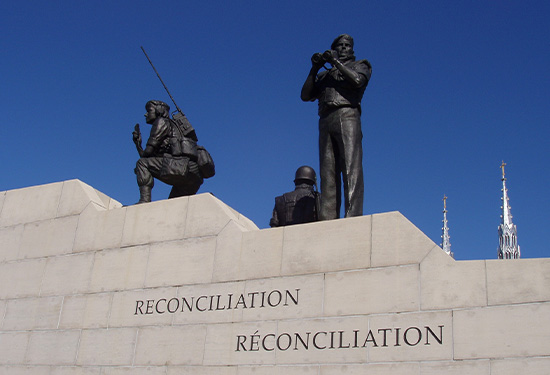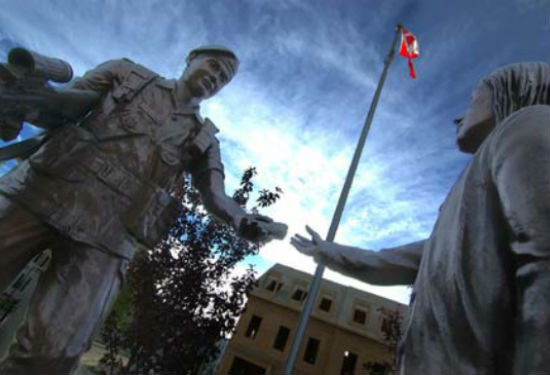Order of events
1880s-1910
France takes control of the area that later became the country of Mali.
1915-1916
Large scale revolts against French rule take place.
1960
Mali gains its independence from France.
1968
A military coup removes the first president of Mali.
1991
A pro-democratic revolution overthrows the military regime.
1992
A new president is elected.
2012
A rebellion begins in northern Mali. Another military coup overthrows the government.
2013
The United Nations Multidimensional Integrated Stabilization Mission in Mali (MINUSMA) begins.
2018
Canadian Armed Forces helicopters, medical teams and support personnel arrive in Mali.
2019
Civilian Canadian police officers begin to deploy for the United Nations (UN) peacekeeping mission in Mali.
2023
Mali asks UN peacekeeping forces to withdraw from the country.
Classroom materials
Canada has a long history of taking part in international peacekeeping operations. One of these peace missions was in Mali from 2018 to 2023. More than 1,250 Canadian Armed Forces members made important contributions to the United Nations (UN) efforts. Their work helped stabilize the country after years of unrest.
Mali
Mali is a large country in northwestern Africa. It is more than 1.2 million square kilometres in area, which is a bit smaller than the province of Quebec. Mali’s northern portions lay in the Sahara Desert and semi-arid Sahel region. The majority of the country’s approximately 22 million people live in the less harsh conditions of the grassland savannahs in the south. This more populated region of the country includes the capital city of Bamako.
Colonization
Mali has a rich history. It was part of several powerful African empires before colonization. European powers rapidly took control of most of the continent in the late 19th century. France laid claim to large portions of northwestern Africa and the area that became Mali gradually fell under its rule between the 1880s and 1910. The colonial government gave it different official names over the years, such as “French Sudan” and “Upper Senegal and Niger.”
The people of Mali tried to rid themselves of this foreign rule. They launched a major uprising against the French in 1915-1916. France defeated the rebellion and retained control of the country for several more decades.
Independence and unrest
Mali became an independent country in 1960. It was not a smooth transition and Mali soon fell under one-party rule. After years of economic decline, a military coup overthrew the original government in 1968. Further political unrest and coup attempts followed. Severe droughts and famines made the political and economic situation in Mali even worse. The situation came to a head with mass protests and a successful pro-democratic revolution in 1991.
With the military regime overthrown, Mali soon passed a new constitution. Multi-party elections took place in 1992. Democratically elected leaders were able to keep the country relatively stable for the next two decades.
Civil war
Major unrest broke out in Mali in early 2012. Rebels seized power in the northern half of the country, seeking independence for the region. This fighting helped lead to another coup in Mali. The situation was complex and the various rebel groups had different goals.
The uprising led to the rise of forces linked to the terrorist group Al-Qaeda. In the first few months of 2013, troops from Mali and France recaptured the territory the rebels had seized. Unfortunately this did not lead to lasting peace. High tensions and conflict continued in northern and central Mali.
The United Nations responds
When the large-scale fighting eased in early 2013, authorities in Mali asked the international community for help. They wanted a peacekeeping operation to help the people of the country. The United Nations Multidimensional Integrated Stabilization Mission in Mali (MINUSMA) soon began.
This large peacekeeping mission had a broad mandate. It carried out security operations to protect civilians and major population centres. It monitored human rights violations and delivered humanitarian aid. The mission also oversaw the return of displaced persons and supported free elections.
More than 15,000 UN peacekeepers from dozens of countries served in Mali over the next ten years. This included more than 1,250 Canadians.
Canadian Armed Forces support

A member of the Canadian Medical Emergency Response Team gives directions during a military exercise, aboard a Chinook helicopter. Mali, March 2019. Photo: Department of National Defence TM02-2019-0033-0072
In 2018, the UN asked Canada for urgent support in the peacekeeping mission in Mali. The UN operations needed help to provide aerial transport, evacuation of the wounded, and medical treatment.
Three CH-147F Chinooks evacuated injured peacekeepers and civilians. They also helped transport UN supplies around the large country. These large helicopters became flying emergency rooms during medical evacuations. Skilled air crews flew the helicopters in Mali’s challenging environment. Onboard, a flight surgeon, critical care nursing officer and two medical technicians provided care. A force protection team traveled with them to guard the helicopter on the ground.
From August 2018 to August 2019, a Canadian contingent of approximately 250 personnel filled these important roles. Operation PRESENCE (Mali) was the Canadian Armed Forces name for our country’s military efforts there.

Members of a CH-147 Chinook force protection team guard the landing zone. This medical evacuation exercise took place near Gao, Mali. 2018. Photo: Department of National Defence (MCpl Jennifer Kusche)
Five CH-146 Griffon helicopters also deployed to Mali. They flew as escorts for the Chinooks to protect them from possible attack. These smaller, armed helicopters also supported other UN efforts. This included long range security operations in remote parts of the country.
Other Canadian military contributions
Task Force Bamako was another way that Canadian Armed Forces members supported the UN peacekeeping efforts in Mali. Up to ten Canadians worked in MINUSMA headquarters operations in Bamako, Mali’s capital city. Some of them also served with a British reconnaissance force based in Gao in the east of the country.
Canadian Armed Forces transport aircraft like the CC-130 Hercules provided valuable service, as well. They carried personnel, supplies and equipment for the UN efforts in Mali and throughout Africa.
Canadian civilian police peacekeepers
Military personnel are not the only Canadians in uniform who take part in international peace operations. Royal Canadian Mounted Police and other civilian police officers also share their valuable skills.
Beginning in early 2019, a contingent of up to 30 Canadian police officers served in Mali. They helped implement Mali’s peace and reconciliation agreement and also helped reform the country’s security services. The police peacekeepers performed many important duties in pursuit of these goals. This included providing security and protecting civilians. They also offered leadership in policing, human rights and gender equality. And they trained local police forces in Mali and neighbouring nations.

Superintendent Kelly Bradshaw of the RCMP was commander of the Canadian civilian police in Mali, during the peacekeeping mission there. 2019. Photo: Royal Canadian Mounted Police
The mission ends
UN peace operations only take place at the invitation of the host country. In mid-2023, the Mali government asked UN peacekeepers to leave. They claimed the MINUSMA mission had failed to stabilize the country. After a decade of peacekeeping efforts, the multinational effort in Mali ended.
Canadian determination and bravery
Mali was a grueling environment for our service members. Extremely hot and arid conditions were common. Canadian Armed Forces peacekeepers performed vital and dangerous duties in this tough climate.
Canadians who deploy on peacekeeping missions often go above and beyond to get the job done. Sometimes this remarkable service is recognized in special ways. For example, three senior Canadian Armed Forces officers earned the Meritorious Service Cross in Mali. Colonel Christopher McKenna, Colonel Travis Morehen and Lieutenant-Colonel Christopher Morrison all received this medal for their exceptional leadership during the UN mission there.
Sacrifice
Canadian peacekeepers make many sacrifices when they serve in overseas missions. Spending six months or a year away from friends and loved ones is very hard. They also face the danger of working in a place in turmoil, with uncertainty about what each day will bring. The family members of those who deploy far from home also share these burdens.
Serving in uniform can sometimes result in injury and death. Approximately 130 Canadian Armed Forces members have lost their lives during international peace efforts. Two Royal Canadian Mounted Police officers also died. No Canadians in uniform lost their lives in Mali. However, more than 300 UN personnel from around the world were killed during peacekeeping efforts there. This steep toll made it one of the most deadly United Nations missions of all time.
- Date modified:





















